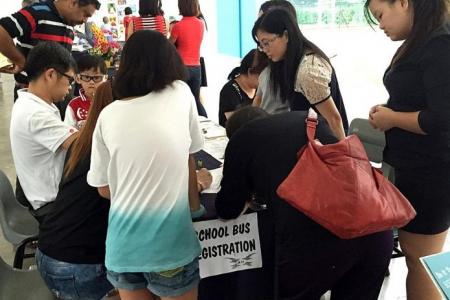Jurong Primary School bus fare rises from $50 to $120 a month
Jurong Primary School bus fares rise
Over the past year, they paid $50 a month for their children to travel to and from school in a school bus.
Some parents of Jurong Primary School pupils are not sure if they can still afford this option next year.
Earlier this month, the school announced that it had appointed a new bus operator after a tender exercise.
Parents who used to pay $50 would now have to pay $120 for the same journey.
One such parent, technician Chai Yik Min, 45, lives about two bus stops from the school.
He has two daughters who will be in Primary 1 and 2 in Jurong Primary School next year.
He said: "I knew the fares would increase, but I didn't think it would be more than double.
"The school is about a 10-minute walk away but they have to cross a main road. Even if I tell them to be careful on the road, I'm still worried because accidents are unpredictable.
"My parents are in their 70s and have walking difficulties. My girls' school bags can be heavy too. If it wasn't so expensive, we would definitely stick to the school bus."
His children will not be taking the school bus any more. He may get his parents to walk them home.
CHOSEN
In a letter to parents on Nov 11, the principal of Jurong Primary School, Mrs Manokara S, said the operator was chosen after three bus companies submitted quotations.
"...JK59 Transport has been selected based on experience, feedback and competitive pricing."
Mr Koh See Choon, the vice-principal, said the school had put up an "invitation to quote" to renew its bus vendor, in accordance with the Ministry Of Education's (MOE) procurement process in which schools renew their bus vendors periodically.
He said: "The fares are comparable to those charged by other bus vendors for the same distances in the same area. For students who need financial support, the school will provide transport subsidies."
The previous bus operator, Cheng Bus Transport, could not be reached for comment.
Parents contacted by The New Paper had no complaints about the previous bus operator.
Singapore School Transport Association (SSTA) chairman Wong Ann Lin said while he sympathises with the parents, $50 a month for a two-way journey would probably mean the bus operator is making a loss.
"Parents would get upset even if the increase is $10. Honestly, bus operators don't make much from ferrying school children and most rely on ferrying workers instead."
A check of MOE's information Notice Board for School Bus Services (IBSB) web page showed that school bus operators who won tenders recently charge a range of fares.
A two-way trip under 2km could cost between $55 and $300.
The IBSB is a pilot programme that allows schools to advertise for school bus services and allows parents to view the details of school bus operators appointed by schools.
Mr Wong thinks MOE should work with SSTA to set a price for all school bus services to avoid such conflicts. In the past, we had tried to suggest a set price but we were accused of being anti-competitive," he said.
Mr Royston Thng, 38, a business analyst, is considering the taxi option, which he has calculated will save him almost $1,000 a year for his two sons.
He lives about four bus stops from the school. He will be asking other parents who live nearby if they want to carpool.
"I wonder if the school had a price guide when they asked for a tender. The fares quoted by the bus company can hardly be justified when compared to a taxi."
Stricter criteria for school bus operators under new scheme
The Singapore School Transport Association (SSTA) and the Consumers Association of Singapore (Case) signed a memorandum of understanding to develop a joint accreditation scheme for the school transport industry earlier this month.
The CaseTrust scheme will subject school bus operators to more stringent criteria, such as taking out a $100,000 insurance bond against closure or liquidation and having clearly-stated refund policies.
The scheme is expected to be launched within six months, with 18 transport operators having already joined the new accreditation scheme.
In the past five years, 39 complaints were lodged against school bus operators. Of these, 10 involved bus operators suddenly terminating their services or collecting deposits and not providing the promised transport service.
Six complaints were about bus operators increasing prices after the consumers had signed the contract. The rest of the complaints involved unsatisfactory services and other price matters.
Get The New Paper on your phone with the free TNP app. Download from the Apple App Store or Google Play Store now



